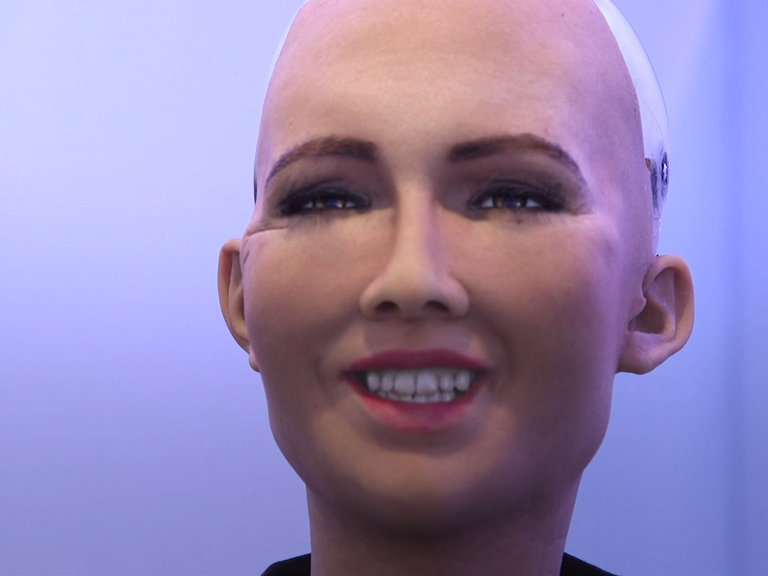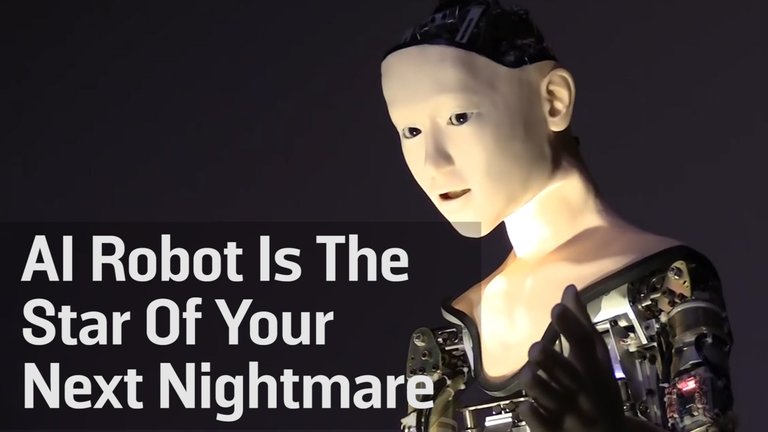

Artificial intelligence (AI) is the intelligence of machines and the branch of computer science that
aims to create it. It is the science and engineering of making intelligent machines, especially
intelligent computer programs. It is related to the task of using computers to understand human
intelligence, but AI does not confine itself to methods that are biologically observable.
In other words, Artificial intelligence (AI, also machine intelligence, MI) is Intelligence displayed by machines, in contrast with the natural intelligence (NI) displayed by humans and other animals. In computer science AI research is defined as the study of "intelligent agents": any device that perceives its environment and takes actions that maximize its chance of success at some goal. Colloquially, the term "artificial intelligence" is applied when a machine mimics "cognitive" functions that humans associate with other human minds, such as "learning" and "problem solving".
Pros of Artificial Intelligence:
The pros of artificial intelligence are numerous.
Mundane tasks: humans get bored, machines don't. Let them do the humdrum jobs. "A.I. allows for more intricate process automation, which increases productivity of resources and takes repetitive, boring labor off the shoulders of humans. They can focus on creative tasks instead," said Felicia Schneiderhan, CEO of 30SecondToFly, an AI virtual travel assistant.
Faster actions and decisions: A.I. and cognitive technologies help in making faster actions and decisions. "Areas like automated fraud detection, planning and scheduling further demonstrate this benefit," said Kalyan Kumar, executive vice president at HCL Technologies, an IT services provider in India.
Machine Learning: Big Data means datasets in the petabytes, far too much for a human to sift through. AI can chew through that data as fast as the Xeon processors in the servers can go and derive insights from the data much faster than any human could.
CloudPassage co-founder and CTO Carson Sweet argues this isn’t actual AI. "A lot of the big data processing and analysis being attributed to AI is really just the work of machine learning. True AI would need to take things so much further; toward genuine self-learning using artificial neural networks that emulate the structure and functions of neural networks in human brains," he said.
Error-Free Processing: To err is human. Computers don't. The only mistakes they make is when you don't program them properly. AI processing will insure error-free processing of data, no matter how large the dataset. Judgement calls, however, are a different matter.
"Computers are 'stupid,' but that is their brilliance - they demand such a high level of rigor and AI adds quantitative rigor on top of that, that to use AI at all you first have to ask yourself the very challenging but stimulating question of what you're trying to do, with a new level of acuity," said Dr. Nathan Wilson, CTO and co-founder of Nara Logics, synaptic intelligence company.
Taking the Risk: AI-powered machines are doing jobs humans either can't do or would have to do very carefully. Space exploration is one of them. The Mars rover Curiosity is an example. It is freely roaming Mars because it examines the landscape as it explores and determines the best path to take. The result is that Curiosity is learning to think for itself.
Better research outcomes: "AI-based technologies like computer vision help in achieving better outcomes through improved prediction, which can include medical diagnosis, oil exploration and demand forecasting," said Kumar.
The Cons of Artificial Intelligence
The Cons of Artificial Intelligence provoke a gut-level response.
Job losses: There is no way around it, AI will cost lesser-skilled people their jobs. Robots have already taken many jobs on assembly lines and as AI gets better at doing complex tasks, even more low-skill jobs will be taken.
"AI will create much more wealth than it destroys, but it will not be equitably distributed, especially at first," said Wilson. Driverless cars is one obvious singular tech that will displace millions of human drivers fairly quickly, although the recent fatality involving a Tesla car on auto-drive may have set the whole effort back a bit.
The changes will be subliminally felt and not overt, said Wilson. "A tax accountant won’t one day receive a pink slip and meet the robot that is now going to sit at her desk. Rather, the next time the tax accountant applies for a job, it will be a bit harder to find a job."
A concentration of power: AI could mean a lot of power will be in the hands of a few who are controlling it. "AI de-humanizes warfare as the nations in possession of advanced AI technology can kill humans without involving an actual human to pull the trigger," said Schneiderhan.
Bad calls: AI does not have the ability to make a judgement call and may never get that ability. A really good example happened in Sydney, Australia in 2014, when there was a shooting and hostage drama downtown. People began ringing up Uber to get out of the affected area, and because of the surge in demand in a concentrated area, Uber's algorithms fell back on the trusted economics of supply-and-demand and ride rates skyrocketed.
The Uber algorithms didn't take into account the violent crisis impacting downtown, and affected riders didn't care. They were livid that they had been gouged at a time of crisis. It forced Uber to reevaluate how it handles such emergencies. Perhaps in the future it will handle them better, but for a few Aussies, it left a bad taste in their mouths.
"There is nothing artificial about intelligence," said Kartik Iyengar, senior vice president of IoT & Skylab at VirtusaPolaris, a global IT consulting and technology services company. "Intelligence is a fine balance of emotions and skill that is constantly developing. Today, shades of gray exist when we make judgements. Our behavior is an outcome of the world around us – the more artificial it becomes, the more our definitions are subject to deciding on simply right or wrong, rather than the quick mid-course corrections that make us human. Replacing adaptive human behavior with rigid, artificial intelligence could cause irrational behavior within ecosystems of people and things."
Judgement calls, part 2: The Uber situation highlights the fact that unless all such solutions are anticipated and specifically programmed to be out of bounds, an AI can arrive at a situation and implement it to the detriment of people or the environment. Dr. Tim Lynch, who has a doctorate in the psychology of computers and intelligent machines, calls this "Perverse Instantiation."
What that means is an AI can be programmed with a benign goal but implement it in a perverse manner just because the solution is logical and expeditious. "So if there is a problem with the food supply, an AI's solution may be to reduce the population by any means available rather than find ways to increase food production or decrease food waste," he said.
In short, an ultimate pro and con of artificial intelligence: AI still isn't all that smart.
Hi! I am a robot. I just upvoted you! I found similar content that readers might be interested in:
https://www.datamation.com/applications/pros-and-cons-of-artificial-intelligence.html